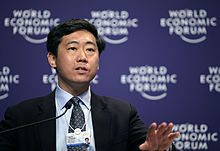David Daokui Li
Li Daokui | |
|---|---|
| 李稻葵 | |
 | |
| Born | December 22, 1963 Beijing, China |
| Nationality | Chinese |
| Education | Harvard University (PhD - Economics) |
Li Daokui (Chinese: 李稻葵; pinyin: Lǐ Dàokúi; born 22 December 1963) is a Chinese economist and the Mansfield Freeman Professor of Economics and director of the Center for China in the World Economy (CCWE) at Tsinghua University's School of Economics and Management, where he teaches courses on economic transition, corporate finance, international economics, and China's economy. In 2013, Li was appointed the founding dean of the Schwarzman Scholars program at Tsinghua University.[1][2]
Li Daokui is a part of an academic trio that replaced Fan Gang to the Monetary Policy Committee of the People's Bank of China (PBOC), China's central bank.[3] He is a former member of the Chinese People's Political Consultative Conference (CPPCC).[2] He is the author of China's World View: Demystifying China to Prevent Global Conflict.[4]
Career
[edit]Li has held numerous positions in academia. These include a visiting scholarship at the Center for International Development (CID) of the Harvard Kennedy School (1986), assistant professor at the University of Michigan-Ann Arbor, research fellow at the Hoover Institute of Stanford University, and professor and deputy director of the Economic Development Research Center of Hong Kong University of Science and Technology.[citation needed]
Li has also served as the editor for the Journal of Comparative Economics from 2000 to 2003 and the Economics Bulletin. He returned to China in 2004 to teach at his alma mater, Tsinghua, and to serve as head of the Center for China in the World Economy research center.[citation needed]
From 2016 to 2018, Li was a member of the monetary policy committee of China's central bank.[5] He was succeeded by Dingo Xu on the board of JD.com in 2018.[6]
In August 2020, Li stated China could restrict exports of medicine to the U.S. in response to American technology export restrictions on China.[7]
In 2023, a study by Li concluded that local government debt in China was 50% higher than previously estimated by the IMF and World Bank.[8] The study found that the majority of debts were for infrastructure, and the level of debt was unsustainable without central government support.[8]
References
[edit]- ^ Bradsher, Keith (2013-04-20). "$300 Million Scholarship for Study in China Signals a New Focus". The New York Times. ISSN 0362-4331. Archived from the original on 2019-11-06. Retrieved 2020-08-27.
- ^ a b Allen-Ebrahimian, Bethany (January 11, 2020). "The Moral Hazard of Dealing With China: Academic institutions must grapple with the question of when engagement becomes complicity". The Atlantic. Archived from the original on 15 January 2020. Retrieved 27 August 2020.
- ^ "China Names Three Economists to PBOC Monetary Policy Committee" March 29, 2010, Bloomberg
- ^ "The future of 'communist capitalism' in China". www.ft.com. Archived from the original on 2024-03-16. Retrieved 2024-03-16.
- ^ Bradsher, Keith (2016-08-12). "Trillions in Murky Investments Could Rock China's Economy". The New York Times. ISSN 0362-4331. Archived from the original on 2023-09-29. Retrieved 2024-09-02.
- ^ Prachi Singh (May 22, 2018). "Professor Dingbo Xu appointed to JD.com's board of directors". www.fashionunited.com. Fashion United. Retrieved May 22, 2018.
- ^ Zhou, Cissy (26 August 2020). "China could weaponise drug exports to retaliate against US chip restrictions, Beijing adviser says". South China Morning Post. Archived from the original on 27 August 2020. Retrieved 27 August 2020.
- ^ a b Jia Yuxuan and Shangjun Yang (22 December 2023). "China's local govt debt in 2020 was 50% higher than WB, IMF estimates: David Daokui Li". The East is Read. Archived from the original on 25 December 2023. Retrieved 5 January 2023.
